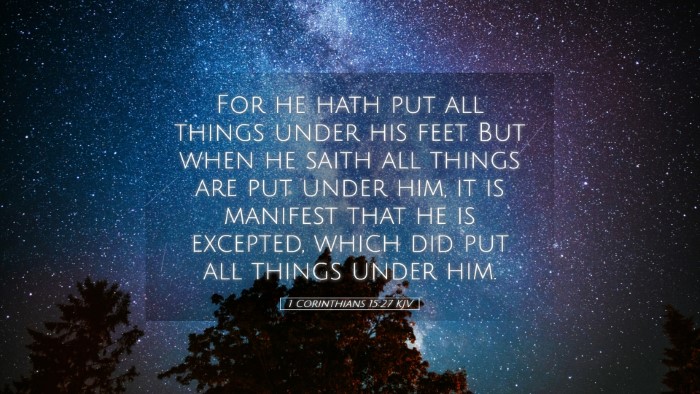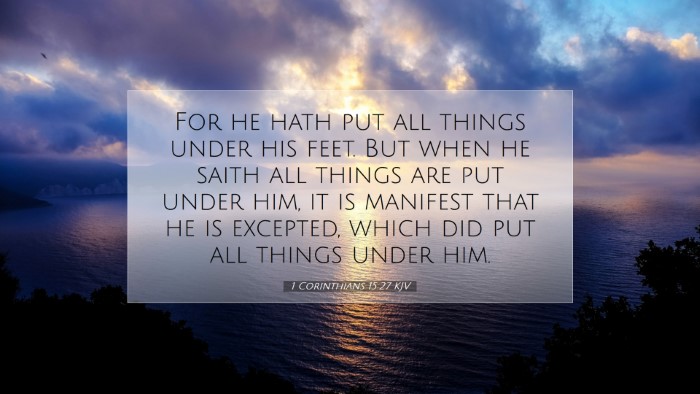Commentary on 1 Corinthians 15:27
Verse Text: "For he hath put all things under his feet. But when he saith all things are put under him, it is manifest that he is excepted, which did put all things under him." (1 Corinthians 15:27, KJV)
Introduction
The Apostle Paul, in 1 Corinthians 15, addresses the complex and profound subject of the resurrection. As he unfolds the implications of the resurrection of Jesus Christ, he emphasizes the ultimate authority and sovereignty of Christ over all creation. In verse 27, Paul references Psalm 8:6 and establishes Jesus' preeminent role in the divine order.
Exegetical Insights
This verse indicates that God has subjected all things to Jesus, who is the Supreme Ruler. Paul clarifies that although all authority has been given to Christ, God, who has subjected everything, remains distinct from the Son. This distinction is fundamental in understanding the nature of the Godhead and the relational dynamics within it.
Matthew Henry's Commentary
Matthew Henry interprets this passage as a clear assertion of Christ's authority over all creation. He argues that the phrase "all things under his feet" symbolizes a comprehensive dominion. Henry highlights that this sovereignty is not just a transient elevation of Christ's status but reflects an eternal truth regarding His divine authority.
- Universal Authority: Henry notes that the phrase implies a complete authority, affirming that nothing is outside Christ's lordship. Every aspect of life, whether in heaven or on earth, falls under His jurisdiction.
- Divine Order: He emphasizes the role of God the Father in this arrangement, revealing that Jesus exercises authority granted by the Father, making it clear that while Christ reigns supreme, the Father retains ultimate sovereignty.
Albert Barnes' Commentary
Albert Barnes adds depth to this understanding by discussing the implications of "all things under his feet." He states that this is a metaphor for total dominion and not merely an abstract concept. Barnes elaborates on the theological significance of what it means for Christ to reign and the expectation of His second coming as a consummation of His reign.
- Messianic Fulfillment: Barnes identifies Jesus as the fulfillment of messianic prophecy, where God’s promise to establish an everlasting kingdom is realized in Christ. This fulfillment is crucial for understanding the anticipated kingdom of God.
- Exemption of the Father: He highlights the necessity of noting that the Father is ‘excepted’ from being under Christ, reinforcing the unique relationship within the Trinity. This distinction implies that while Christ reigns universally, the Father is the source of that authority.
Adam Clarke's Commentary
Adam Clarke delves into the nuances of Paul's wording and its implications for the Church. He reflects on Paul's intent to reassure believers of Christ's sovereign control amid confusion and doubt regarding the resurrection.
- Encouragement for Believers: Clarke emphasizes that this verse serves as an encouragement for Christians to live in light of Christ’s authority. By understanding Christ’s dominion over all things, believers can find hope and strength in their faith, especially regarding resurrection promises.
- Relation of Christ and Creation: He also points out that Paul asserts power over evil, sin, and death through this dominion, drawing a clear message that through Christ's resurrection, believers will also be resurrected and restored.
Theological Implications
The theological implications of 1 Corinthians 15:27 are profound, reverberating through Christology, soteriology, and eschatology. This passage invites analysis of the nature of God's authority and Christ's operational role in redemptive history.
- Christ as King: The recognition of Christ’s reign prompts discussions on His kingship and what it means for Christian living. A Christ-centered life acknowledges His lordship over personal, communal, and global spheres.
- Resurrection Assurance: Understanding this verse is crucial for grasping the assurance of resurrection and eternal life promised to believers, as presented throughout the New Testament.
- Relationship within the Godhead: The distinction made in the verse fosters a deeper understanding of the inter-Trinitarian relationship, which informs doctrines of the nature of God and the mystery of faith.
Conclusion
1 Corinthians 15:27 encapsulates the essence of Christ's sovereignty, authority, and role in God's salvific plan. As we explore insights from Henry, Barnes, Clarke, and other theologians, we are invited to deepen our understanding of Christ’s dominion and its implications for our faith and practice. Ultimately, this verse serves as a cornerstone for Christian hope and discipleship, reinforcing the truth that all authority in heaven and earth is held by our Lord Jesus Christ.


